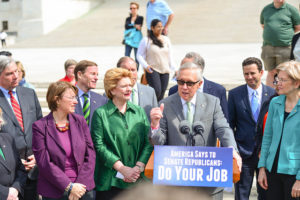
U.S. Senate Minority Leader Harry Reid and other Democratic Senators at U.S. Supreme Court
Republicans must feel like they’ve dodged a bullet. We have written for years about the GOP Civil War, which threatened to spill out into the open and tear the party apart during the Republican National Convention this summer. That could still happen, but meanwhile, Republican leaders recognized Donald Trump as the presumptive nominee within hours of his Indiana primary win on May 3. Instead, it is now the Democratic Party that is threatened with civil war, as Bernie Sanders essentially runs a third party campaign against the Democratic Party, from inside the Democratic Party.
Continue Reading »

Hillary Clinton vs. Donald Trump 2016
There’s a not-so-secret weapon looming in the likely 2016 presidential election between Hillary Clinton and Donald Trump. Want to guess what it is? Here are a few hints: it’s very powerful, it exists in large numbers, and one of the presidential candidates is one. What’s the secret weapon?
Continue Reading »

Donald Trump speaking in Manchester, NH last February
After Donald Trump‘s big win and Hillary Clinton‘s near tie in the Indiana primaries last Tuesday, given the resulting delegate math, attention immediately turned to the likely upcoming general election between Trump and Clinton. While the criticisms that can be leveled against Trump are many, voters might become distracted if too many such charges come flying across the airwaves. In order to keep it simple, we have identified three areas in which Trump is most vulnerable to criticism and political attack in the general election:
Continue Reading »
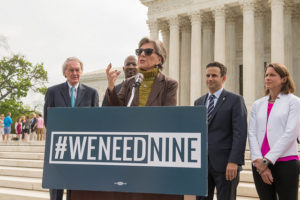
Democratic U.S. Senators Barbara Boxer, Edward Markey and others demonstrate for a full Supreme Court
Once again, the 2016 presidential primaries have been an emotional roller-coaster. The Democratic Party, while not engaged in open civil war like the Republicans, has certainly felt the sting. Nasty things have been said, hurt feelings have been felt. Therefore, while Hillary Clinton has all but won the Democratic Party nomination and Bernie Sanders has all but conceded, and the endgame is near, no one can expect Democratic Party unity overnight. Instead, Democratic voters should now focus and fight together on the issues that unite them against the Republicans. Here’s a partial list of such issues:
Continue Reading »
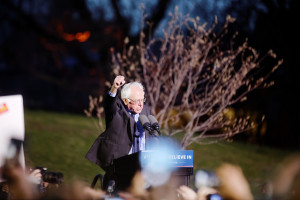
Bernie Sanders speaking in South Bronx, NY
Last night’s Democratic Party primary results in Maryland, Pennsylvania, Delaware, Connecticut and Rhode Island were clarifying for a couple of reasons. First, Hillary Clinton‘s wins over Bernie Sanders in four out of the five states other than tiny Rhode Island, especially her healthy and wide margins of victory, respectively, in delegate-rich Pennsylvania and Maryland, all but assured that Clinton will clinch the Democratic Party nomination for president. The other clarifying element of last night’s results was that the endgame for Clinton, Sanders and the Democratic Party finally started to emerge. Here’s what that endgame looked like:
Continue Reading »

Hillary Clinton speaking in Durham, NC
Last night’s New York Democratic Party primary was a defining moment in the sometimes nasty presidential nomination contest between Hillary Clinton and Bernie Sanders. Clinton won a decisive victory, with a margin as of this writing of some 16 percent and a net gain of about 33 pledged delegates. [Note: these results are subject to updates]. Coming at a time when Sanders needs to win virtually every state left by a landslide, his loss to Clinton in New York turns his nomination chances from “nearly impossible” to “pretty much unimaginable.” Perhaps knowing this, Sanders spent yesterday in Pennsylvania instead of New York, supposedly to campaign for next Tuesday’s primaries, but then reportedly left his press corps in Pennsylvania last night and exited back home to Vermont. So the question becomes, what happens now?
Continue Reading »

Presumably a pro-tax protester, 2010
Why hasn’t Bernie Sanders released his tax returns for prior years? That’s the question an increasing number of people are asking. First, Sanders answered, “My wife does our tax returns. We have been a little busy lately.” Then, Sanders falsely claimed that “Of course, we have released them in the past.” On Monday, Bernie’s wife Jane gave an interview with Mark Halperin of Bloomberg TV‘s “With All Due Respect” that was beyond embarrassing on the Sanders’ taxes issue. Jane Sanders said, in response to various questions by Halperin: “I have to go back and find them,” “We haven’t been home for a month,” “When they’re due, I would expect them to come out,” “They’ve [the Clintons] been in office all these years, they have done it,” etc. In reaction to all of these delays and excuses by the Sanders, folks are starting to say the following things:
Continue Reading »
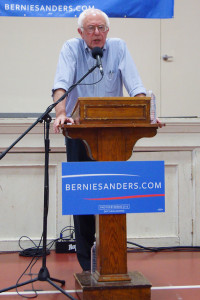
Bernie Sanders campaigning in Franklin, NH
Bernie Sanders is having a tough week. Instead of trying to capitalize on his Wisconsin primary win on Tuesday, Sanders has had to contend with the fallout from a New York Daily News editorial board interview last Friday that has been described as “pretty close to a disaster,” in which Sanders appeared not to know the substance or process of numerous issues, including his own pet issue, free college. Then, yesterday, Sanders added to his image as a candidate who may have lost his bearings when he said of Hillary Clinton, “I don’t believe that she is qualified” to be president of the United States. Sanders latest remarks were actually three mistakes in one:
Continue Reading »
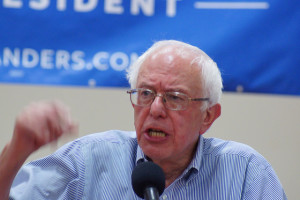
Bernie Sanders in Franklin, NH
Bernie Sanders said at the outset of his presidential campaign that “I’ve never run a negative ad in my life,” and that he would not do so against Hillary Clinton or other candidates competing with Sanders for the Democratic Party nomination. Since beginning his presidential campaign, however, Sanders and his staff have turned deceitful, cynical and hypocritical, resorting to tactics that would make even a Republican blush. Sanders’ run for the nomination is a case of Dr. Jekyll and Mr. Hyde, with much more of the latter. Here’s a partial list of Bernie Sanders’ campaign actions:
Continue Reading »
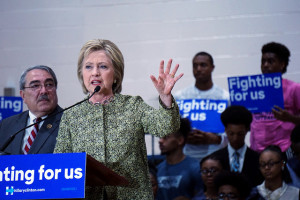
Hillary Clinton speaking in Durham, NC
Hillary Clinton gave a speech in Madison, Wisconsin on Monday, in which she blasted Republicans for refusing to consider President Barack Obama‘s U.S. Supreme Court nominee, Merrick Garland. Likewise, Clinton has released a new ad focusing on New Yorkers, and specifically attacking Donald Trump. Clinton’s new focus on Trump, the Republicans and Supreme Court nominations — one of a president’s most important Constitutional powers — seems to represent a shift from the presidential primaries to the general election.
Continue Reading »












